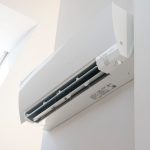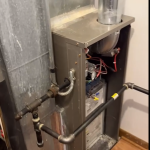The Difference Between a Clean and Dirty Air Filter in HVAC Systems
Your HVAC system plays a crucial role in maintaining a comfortable and healthy indoor environment, but one of the most critical components—often overlooked—is the air filter. The state of your air filter can dramatically affect the performance of your HVAC system, your energy bills, and even your health. In this blog, we’ll explore the difference between a clean air filter and a dirty one, and why regular maintenance is key to avoiding the consequences of neglect.
Clean Air Filters: The Unsung Heroes
A clean air filter is the first line of defense in your HVAC system, ensuring that the air circulating in your home is free from dust, pollen, pet dander, and other airborne particles. When the filter is clean:
- Efficient Airflow: A clean filter allows air to flow freely through the system. This means your HVAC unit doesn’t have to work as hard to maintain your desired temperature, which in turn reduces energy consumption and extends the lifespan of the system.
- Better Indoor Air Quality: With a clean filter, more contaminants are trapped, preventing them from being recirculated throughout your home. This is particularly important for those with allergies, asthma, or other respiratory issues.
- Optimal System Performance: A clean air filter ensures that the HVAC system can perform at its best. It helps maintain the efficiency of the unit, keeping your home comfortable and your energy bills lower.
Dirty Air Filters: The Silent Saboteurs
When an air filter is neglected and allowed to become dirty, the consequences can be significant:
- Restricted Airflow: A dirty filter restricts airflow, forcing the HVAC system to work harder. This increased strain can lead to overheating, increased wear and tear, and eventually, system breakdowns.
- Increased Energy Consumption: As the system struggles to push air through a clogged filter, it consumes more energy. This not only leads to higher utility bills but also reduces the overall efficiency of your HVAC system.
- Poor Indoor Air Quality: A dirty filter can no longer effectively trap airborne particles, allowing dust, allergens, and even mold spores to circulate freely in your home. This can exacerbate allergies, asthma, and other respiratory conditions.
- Potential for System Damage: Over time, a dirty filter can cause dust and debris to accumulate on critical components of the HVAC system, such as the coils and blower motor. This can lead to costly repairs and, in severe cases, the need for a full system replacement.
The Importance of Regular Maintenance
Regularly checking and replacing your air filter is one of the simplest and most effective ways to ensure your HVAC system operates efficiently and provides clean, healthy air. Most filters should be checked monthly and replaced every 1-3 months, depending on the type of filter and the conditions in your home (e.g., pets, smoking, or high dust levels).
Beyond just replacing filters, scheduling annual HVAC maintenance with a professional technician can help identify and address issues before they become major problems. A well-maintained system not only performs better but also lasts longer, saving you money in the long run.
Conclusion
In the grand scheme of HVAC maintenance, the air filter may seem like a small detail, but its impact is anything but minor. Keeping your air filter clean and ensuring regular maintenance of your HVAC system is essential for maintaining indoor air quality, system efficiency, and overall comfort in your home. Don’t wait until you experience the costly consequences of neglect; make air filter replacement a regular part of your home maintenance routine.


